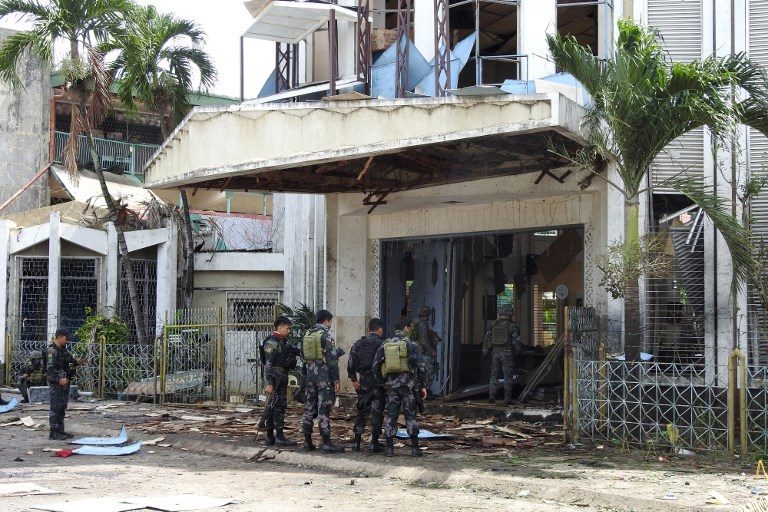SUMMARY
This is AI generated summarization, which may have errors. For context, always refer to the full article.

MANILA, Philippines – The Armed Forces of the Philippines (AFP) said its own findings matched a media report that said the suicide bombers in the twin attack at a Catholic cathedral in Jolo last January 27 were Indonesians.
“The media report quoting Indonesian authorities that the perpetrators in the Mount Carmel Cathedral explosion in Jolo, Sulu was an Indonesian couple comes as a confirmation of our own findings in the thorough investigation we conducted,” said AFP spokesperson Brigadier General Edgard Arevalo in a statement.
A report by the New York Times published on Tuesday, July 23, said the attack that killed at least 23 people and wounded more than 100 others was carried out by Rullie Rian Zeke and his wife, Ulfah Handayani Saleh, according to Indonesian police.
The couple went to Turkey in 2016 hoping to cross the border into Syria, part of the main territory of the Islamic State (ISIS) terror group. But they were arrested in January 2017 and deported to Indonesia, the report said.
Indonesian police said Rullie and Ulfah were identified as the culprits behind the Jolo cathedral attack during the interrogation of two suspects arrested in Malaysia in May, the report added.
A separate report by the Associated Press (AP) also citing Indonesian police said that an Islamic militant arrested in the Indonesian province of East Kalimantan confessed to having recruited Rullie and Ulfah for the Jolo attack.
The AFP said they shared notes and “vital information” with their Indonesian counterparts.
“Those data which were based from our own inquiry and intelligence contributed to their deliberations that led to this confirmation,” Arevalo said.
On the morning of Sunday, January 27, barely a week after the referendum that ratified the Bangsamoro Autonomous Region in Muslim Mindanao, a bomb exploded inside the Jolo cathedral in the middle of Mass. Moments later, as the panicked crowd was rushing from the scene, a second bomb went off near the cathedral’s main doors.
ISIS claimed responsibility for the attack with a formal communique that said two suicide bombers had detonated explosive belts, according to the SITE Intelligence Group, which monitors jihadist activities worldwide.
The AFP initially pointed to the Abu Sayyaf Group faction led by Hatib Hajan Sawadjaan as the “mastermind and financier” of the attack. Secretary of Interior and Local Government Eduardo Año later said Sawadjaan was the new “ISIS head” in the Philippines and that unconfirmed findings indicated two Indonesian suicide bombers with links to ISIS were behind the twin blasts.
The Indonesian couple and their recruiter, identified as “Yoga,” were part of Jemaah Anshorut Daulah, an Islamic extremist group banned in Indonesia and allied with ISIS, said the AP report.
Faced with setbacks in the Middle East, ISIS has shifted its focus to Southeast Asia, calling on its followers in the region to “wage jihad” locally instead of traveling to Syria or Iraq.
The southern Philippines, loosely governed and long troubled by insurgency, was a relatively easy target.
From May to October 2017, the ISIS-linked Maute terror group laid siege to Marawi City. Remnants of the group are at large and known to be recruiting new members.
The AFP and the Philippine National Police recently said a Filipino suicide bomber was behind an attack on an army camp in Indanan, Sulu, on June 28.
On Tuesday, July 23, the AFP Western Mindanao Command said 7 “foreign terrorists” likely with links to ISIS are operating among terror groups in Sulu, Basilan, and Maguindanao.
“This development further highlights the importance of cooperation and information sharing between and among countries in the region particularly Indonesia, Malaysia, Singapore, and the Philippines. Not only on matters with relevance to the military, but also those that impact on the police to bolster our security postures,” Arevalo said. – Rappler.com
Add a comment
How does this make you feel?
There are no comments yet. Add your comment to start the conversation.